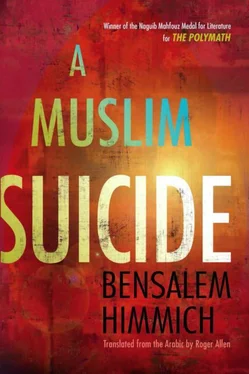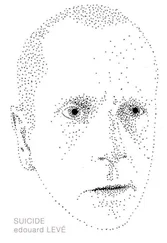Here then was the incident that I had anticipated happening in conjunction with the sheer happiness of my marriage, like some foul dissonance! How else could I respond to it other than by repeating the usual expressions: "Every soul will taste death, and verily we belong to God and to Him do we return!"
No indeed, since I had trained myself to strive toward the absolute and the lofty heights of truth, there could be no other way. If I failed to achieve substantiation in the ultimate, it could not be held against me. What does seem relatively certain is that I will never be able to achieve that felicitous state so long as I remain alive and am continually put to the test by feuds, trials, and petty jealousies; or, put another way, by an existence that is bound and foreordained. The real lesson to be learned lies in desire and means of focusing it and in longing and means of kindling it, to such an extent that I can repeat the words of Abu Yazid al-Bistami:

But, no matter how much time I may spend trying to rid myself of my own materiality and corporeal form, I will never be able to match the words "Praise be to me, praise be to me, for I am the truth…. in heaven there is God alone," those being the words that poured from the mouth of Abu Mansur al-Hallaj-may God sanctify his spirit and forgive him his willful provocation.
When it comes to famous mystics like Al-Hallaj, to Rabi'a a1-`Adawiyya* before him, and Al-Suhrawardi after him, not to mention others who chose to confront people and rulers with the truth, I find myself hardly differing from any of them when it comes to adopting controversial positions. Indeed there remain spheres and dimensions that I would never be able to traverse even if I were to live two lives or more. From my perspective the foundation of all thought is always there to watch over my contemplations, offering advice and direction every time my passions and enthusiasms are aroused and my mind tends to wander off into realms of temptation. Today more than ever before, that consistency stays with me. To the controls imposed by my own self I have now added those of my household, although I have to note that, with regard to the latter, I will never play the tyrant. Rather I will only adopt whatever is readily available, since I fully intend to entrust both keys and rituals to the lady of the house, she being the decisionmaker and organizer.
Ah my sweet lady and beloved! Whenever I find myself needing distraction and good company, I call her or send someone to fetch her. She appears with a smile and kisses my hand; I do likewise to hers. She washes my feet, and I do hers. Then we may eat and pray together, after which I may share some ideas about the principles of faith or teach her how to play chess. After a while I let her win, but, when she realizes that I am faking it, she starts pounding my chest. "You phony," she yells, "you absolute phony!" With that, she lies back on my knees, or else I use her lap as a soft pillow. Depending on how much time there is, we then share sad stories with each other. She tells me about her family in Sabta and Tangier, and what its various members, chief amongst whom is her uncle, are doing to assist the impoverished families who keep arriving at the two cities from Spain; and about how much she loves songs, muwashshah poetry, and playing the flute. For my part I give her a few concise details about my past life in Murcia, about my students who now constitute my own family, and about the death of 'Amr from Cordoba at the hands of the Castilian forces. However I decide not to say anything about my Sufi philosophical preoccupations, leaving it to my wife's intelligence to indulge in surmise about that particular topic. With regard to other matters, they reside in the bowers of intimate conjugal life about which no details should leave the private domain.
Several months went by like this, with me thoroughly enjoying life in the care of my beloved wife, praying, studying, and writing in my own prayer-cell. I was also able to relish some moments of intense emotional rapture and crystalline ideational radiance, blessed glimpses perhaps of promised eternity.
One day I was finding it impossible to finish a chapter of my book, Escape of the Gnostic, so I went for a stroll around the quarters where the house was located-something I regularly did when I found myself in such a fix. It was evening, and I started hearing some music and singing. I rushed over to its source and peered through a crack in the door, only to see Fayha' playing the flute, accompanied by Ghazlan on the lute and Hafsa on the drum while 'Abla danced and sang a lovely muwashshah poem that I did not recognize. It turned out that I was to secretly observe such a scene on several occasions until there arrived one final occasion about which I cannot remain silent. I happened to look at my wife and noticed that she was taking turns with Ghazlan eating an apple and then playing her flute while the boy rested his head on her thigh and sang a sentimental song. I could not control myself. Throwing the door open, I yelled, "What's going on here?" The boy leapt up looking alarmed and ran away. For her part, Fayha' stared at me, then burst into a peal of laughter the like of which I have never heard before. I asked her why she was laughing so hard. She calmed down, looked straight at me, and spoke so calmly that it gave me the shivers. "Abduh," she said, "Ghazlan is like a son or daughter to me. Can't you see that he's a boy who looks just like a girl? Why all this jealousy and anger?" With that she burst into tears, interrupted by expressions of regret because she was barren and words of gratitude at her lot and praises to God who had enabled her to adopt Ghazlan as an orphan and let him provide her with some degree of consolation.
I immediately apologized. Once we were in bed, I asked her again to forgive me, cursing the Devil who had thrust suspicions into my mind. I whispered that I too intended to adopt the boy. I'm going to name him Muhammad, but you can keep calling him by his usual name. Fayha' agreed to the idea. "So be it, Abu Muhammad!" she said, finally relaxing a little. Next morning I told the young man what would happen. After a moment's thought he kissed my hand, clearly much affected by my decision. "My lord," he said, "name me Hamada instead!"
There came another day when the angel of all evil whispered in my ear yet again. "Your lady wife leaves the house on Mondays and Thursdays, and once or twice a month she travels to Tangier, while you stay here ignoring the whole thing!"
My wife had already told me that she was still in close touch with her family in both Sabta and Tangier; she needed to maintain her family ties and offer help to the aged and infirm. But, in spite of all that, I decided that I needed to squelch once and for all the needlings of the accursed Devil and to resolve any remaining doubts by establishing the facts for certain. Every time she was compelled to go out without telling me-her excuse being that she did not want to disturb me, I started following her in disguise. In Sabta my detective work showed that she went either to see her elderly aunt, Umm Haniyya, or to visit various charities like the infirmary, orphanage, and home for indigent emigres from Spain. From various sources in those facilities I also learned that the generous lady used to bring as many anonymous gifts in money and kind as she could. With regard to her trips to Tangier, she told me how long they would take and where she was going. She used to travel with the servant Bilal, the young boy Hamada, and other travelers. I trailed them on horseback and through my secret observations was able to reassure myself that my wife was well protected at the residence of her uncle, Hajj Hamza al-Sarraj. That settled, I headed for the city mosque at sunset, performed the prayers along with the congregation, and then performed the supplementary intercessions. My only prayer was that God would forgive me for my suspicions and place a firm barrier between me and such evil thoughts. I then made my way back to Sabta, taking a back road with few travelers on it.
Читать дальше













